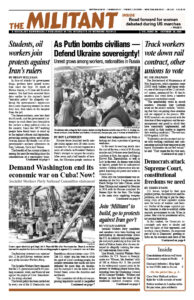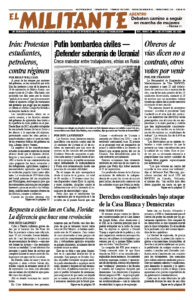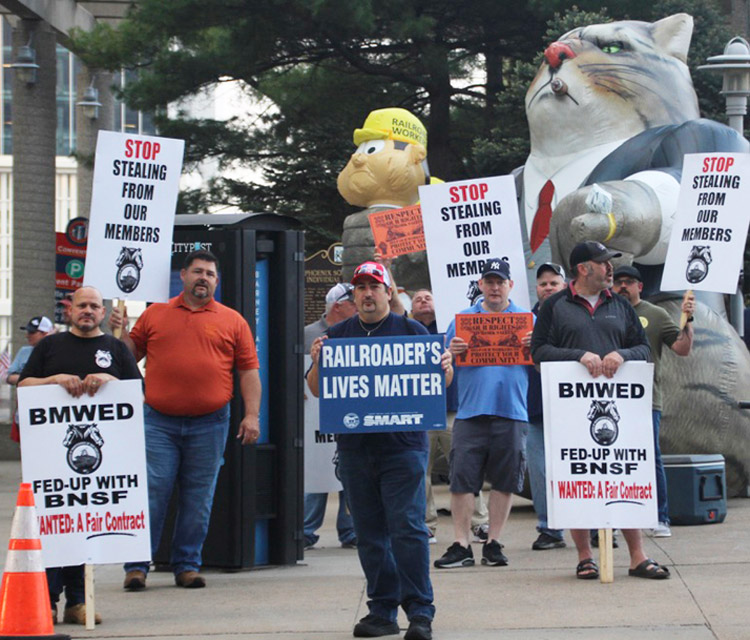The Brotherhood of Maintenance of Way Employees, which organizes some 25,000 track builders and repair workers, one of the largest of the 12 rail workers’ unions, announced Oct. 10 that its members had voted down a tentative agreement reached last month.
“The membership voted in record numbers,” President Tony Cardwell wrote on the union’s website, “exhibiting that they are paying close attention and are engaged in the process. BMWED members are concerned with the direction of their employers and the mismanagement and greed in which they have consistently implemented, and are united in their resolve to improve their working conditions.” The vote was 6,646 against, 5,100 for.
“Railroaders are discouraged and upset with working conditions and compensation and hold their employer in low regard. Railroaders do not feel valued,” he said. “They resent the fact that management holds no regard for their quality of life, illustrated by their stubborn reluctance to provide a higher quantity of paid time off, especially for sickness.”
“Those that voted against the agreement see it as a slap in the face,” Rod Blessing, assistant local chair for Brotherhood of Maintenance of Way Employees Lodge 1320 in Lincoln, Nebraska, told the Militant Oct. 10, “not getting more paid time-off days in cases where they need medical care. And they think a higher wage raise is needed with increasing inflation costs.”
Rail bosses routinely send BMWE workers hundreds of miles from home for work. A key outstanding issue is how and when they get paid for these trips.
Conductors and engineers, members of the two largest rail unions — the Transportation Division of the Sheet Metal, Air, Rail and Transportation Workers (SMART-TD) and Brotherhood of Locomotive Engineers and Trainmen, with a combined membership of over 60,000 workers, have yet to vote on their tentative agreement.
Discussion over the fact that the contracts don’t address workers’ main concerns — inhuman, arbitrary and dangerous work schedules, punitive attendance policies and boss demands to cut “crew” size to just an engineer! — is smoldering in rail yards and on locomotives.
These workers were sent a video Oct. 7 where BLET President Dennis Pierce and SMART-TD President Jeremy Ferguson discuss the tentative national freight agreement.
Pierce said that starting Oct. 17 members of both unions will have 30 days to read, discuss and vote on the contract proposal. The results will be announced in mid-November.
As the contract debate is unfolding, the National Transportation Safety Board reported a few months ago that in the last 25 years nearly 500 rail workers have been killed while doing their jobs. Some 150,000 more have been injured. That averages nearly 20 railroad workers killed and 6,000 injured a year.
Rail workers killed on the job
Three SMART-TD members were killed on the job over the last six weeks. And a derailment after two freight trains collided near Miami International Airport Sept. 24 put four crew members into the hospital. Their co-workers are angry because the CSX railroad, who they work for, hasn’t said anything about what caused the collision or reported the conditions of their fellow union members.
The responsibility for rail workers’ deaths lies with rail bosses pushing for longer and heavier trains — up to three miles long — with smaller and smaller crews, on schedules that dictate constant fatigue, often insufficient training and a profits-first goal of cutting corners.
International Association of Machinists District 19, which organizes the 6,600 locomotive machinists, track equipment mechanics and facility maintenance workers, voted down their tentative agreement by 75% last month. Three days before a Sept. 29 strike deadline, union officials announced they had reached a second proposed contract. Results of the vote are supposed to be announced no later than Nov. 20.
“Everything isn’t all about pay. It’s about our way of life,” John Flibotte, a machinist on the Union Pacific railroad in Council Bluffs, Iowa, told Omaha station KMTV3 Oct. 5, as he and a few other rail workers carried out an informational picket line. Talking about what Brotherhood of Locomotive Engineers and Trainmen and SMART-TD workers face, he said, “There are guys, conductors and engineers, that can’t take a day off without fear of repercussions and getting fired.”
To be able to go to a doctor’s appointment under their proposed contract, he said, they have to “make appointments on a Tuesday, Wednesday or Thursday and schedule those 30 days out.” This makes getting timely tests or follow-up visits almost impossible.
American Train Dispatchers Association members ratified a tentative agreement Oct. 4. They are the fourth rail union to approve an agreement, along with the International Brotherhood of Electrical Workers, Transportation Communications Union/IAM and Brotherhood of Railway Carmen.
In the fight to secure a contract that begins to meet our needs and to get control of our work schedules and the conditions we face, the place to start is by strengthening our unions and taking steps to get out the truth about what we face to other workers and farmers to win their support.


